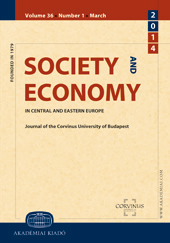Effects of the financial and economic crisis on the rural landscape as well as the agri-food sector in Europe and Central Asia
Effects of the financial and economic crisis on the rural landscape as well as the agri-food sector in Europe and Central Asia
Author(s): Csaba Csaki, Gertrud BuchenriederSubject(s): Supranational / Global Economy, Agriculture, Economic history, Economic development
Published by: Akadémiai Kiadó
Keywords: financial crisis; ECA; agri-food sector;
Summary/Abstract: This paper reviews the expected effects of the current financial crisis and subsequent recession on the rural landscape, in particular the agri-food sector in Europe and Central Asia (ECA) on the basis of the structure of the rural economy and of different organisations and institutions. Empirical evidence suggests that the crisis has hit the ECA region the hardest. Agriculture contributes about 9% to gross domestic product (GDP) for the ECA region as a whole with 16% of the population being employed in the agricultural sector. As far as the impact of the financial crisis on the agri-food sector is concerned, there are a few interconnected issues: (1) reduction in income elastic food demand and commodity price decline, (2) loss of employment and earnings of rural people working in urban centres, implying also costly labour reallocation, (3) rising rural poverty originating mainly from lack of opportunities in the non-farm sector and a sizable decline of international remittances, (4) tightening of agricultural credit markets, and the (5) collapse of sectoral government support programs and social safety-net measures in many countries. The paper reveals how the crisis hit farming and broader agri-business differently in general and in the ECA sub-regions.
Journal: Society and Economy. In Central and Eastern Europe ǀ Journal of the Corvinus University of Budapest
- Issue Year: 33/2011
- Issue No: 2
- Page Range: 249-270
- Page Count: 22
- Language: English

